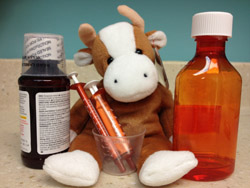“How hard is it to give a kid medication? The kid is not the boss!” a new naïve doctor exclaimed in frustration. I calmly explained that it is NOT as easy as you would think in some cases. Of course, in the back of my head, I arrogantly thought that I was always able to give my child his medication.
Fast forward to the very next evening: There I was sitting in the bathroom with my toddler, who had another ear infection, and was about to get in the bath. I was ready with my oral syringe of ibuprofen. He was not interested. I held him tightly. Put the syringe between his back teeth and cheek and squirted the medicine into his mouth as he fought with all his might. Victory! I thought, but suddenly released my grip as he started gagging. The next 5 seconds occurred in slow motion. As he ran from me gagging, he vomited the medication onto the floor in front of him, slipped in it, flew head first hitting the partially open door and belly flopped his naked body onto the cold tile floor. You know what they say about “PAY BACK”… in those 5 seconds I turned into the worst mother ever and learned that it is in fact hard to give medications.
So how do you give medications?
Here are some tips taken mostly from the wonderful nurses I have the pleasure of working with. Not every method will work for every kid.
1) Be calm. Your anxiety and your child’s anxiety are often a major part of the difficulty with getting the cooperation you desire.
2) Remember that you are the parent and medications are not optional.
3) Don’t lie to your child by saying things like “you’ll like this” if you know in fact that it tastes terrible. Recognize that they may not like it but it is necessary for them and give them something immediately after that they like.
4) Many common medications come in multiple forms which may include liquids, chewable, dissolving tablets, capsules that can be opened and mixed into foods or swallowed whole, etc. Discuss the options with your doctor or pharmacist. I have seen kids as young as 6 years old swallow adult size pills. Don’t under estimate your kids.
5) Some liquid medications can be flavored by the pharmacy to match your child’s preference but there maybe an extra cost for this. Medications that are bitter may taste best mixed or chased with chocolate syrup.
6) Some capsules can be opened into peanut butter which is hard to spit out.
7) Oral medication syringes are AWESOME. They make giving medications more accurate and less messy and are highly recommended. If your child has not seen one before they may be afraid of them. Let them play with it. Suck up water or juice with it and squirt it into their months before introducing the medication. Play is powerful.
8) For infants and very young children use the syringe to put small amount of medications between the lower gums and cheek. This will help decrease the taste of the medication, decrease gagging, and also decrease the normal reflex of using the tongue to push the medication back out of the mouth.
9) Bribes are OK, just make sure you can follow through on them. A couple M&Ms may be fine with each dose, but $20 or a new toy will cost you over time.
10) Older children can be taught to swallow pills. Try using gradually increasing sizes of candy with big drinks of liquids. Start with a Tick-Tack or a tiny mint (something not scary to your child) and move up in size from there.





Comments